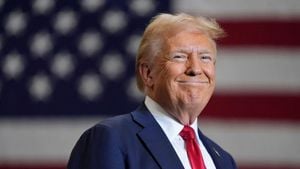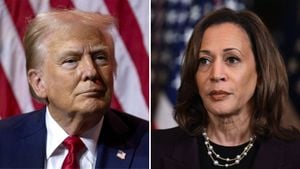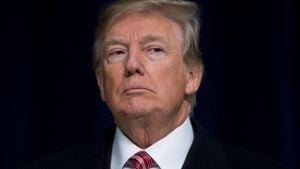Donald Trump’s recent decision to appoint Robert F. Kennedy Jr. as the head of the Department of Health and Human Services has triggered intense reactions across the political spectrum. This nomination is not just another appointment; it brings to the forefront Kennedy's long-standing views on vaccines and public health, which have been polarizing and contentious.
CNN anchor Jake Tapper made headlines with his sardonic remark upon hearing the news, declaring, "Well, America, I hope you like measles." This comment encapsulates the skepticism many hold about Kennedy, who has gained notoriety as a vaccine skeptic and has publicly questioned the safety and efficacy of vaccines, particularly the COVID-19 vaccine.
Kennedy, once heralded as the scion of the storied Kennedy family, has shifted his focus from environmental law to politics, garnering attention for his conspiracy theories and anti-vaccine stance. Following his suspension of his presidential campaign, where he ran as an independent, he quickly endorsed Trump, solidifying their political alliance. This move has sparked speculation about how Kennedy's leadership might reshape the narrative around public health strategies and vaccination rates across the nation.
Trump praised Kennedy as someone who "wants to make people healthy," yet his remarks carried an ambiguous edge, particularly when he quipped, "Don’t get too popular, Bobby." This kind of comment is emblematic of the complex relationship between the two figures, who, on the surface, seem aligned yet have operated within very distinct political paradigms.
Critics of the appointment, including members of Trump's own party and public health experts, have expressed alarm. The New York Post editorial board was particularly scathing, stating, "Installing Kennedy breaks the first rule of medicine: do no harm." Given Kennedy’s history of controversial public statements, including those asserting unproven racial vulnerabilities to COVID-19, many are concerned about the potential ramifications of his oversight of the nation’s health policies.
Tapper isn’t alone; he has faced off against Kennedy publicly, labeling him as "a conspiracy theorist whose views are so false, unhinged, and dangerous to public health" and refusing to debate with him. Kennedy's claims have even prompted some of his own family members to publish op-eds against him, calling attention to their disagreements about his stance on vaccines.
For Trump, placing Kennedy at the helm of HHS fits within his broader anti-establishment sentiment. On the campaign trail, Trump emphasized the need to challenge the so-called "industrial food complex" and drug companies. He stated, "For too long, Americans have been crushed by the industrial food complex and drug companies who have engaged in deception, misinformation, and disinformation when it’s come to public health." This rhetoric resonates with many of his supporters who feel disillusioned with traditional public health narratives.
Kennedy's history of promoting vaccine skepticism can be linked to broader trends across America. His assertions have found fertile ground, as public trust in vaccines continues to wane. Many individuals are questioning vaccines due to past experiences with COVID-19 vaccinations, which faced substantial pushback and controversy through government mandates. Since then, vaccination rates for childhood diseases have reportedly entered concerning declines.
Analysts warn about the potential public health crises tied to Kennedy’s views. Vaccine hesitancy, already rising, could spiral, leading to increased outbreaks of preventable diseases like measles. Evidence from global contexts, such as the Samoa measles outbreak which led to numerous fatalities, demonstrates the potential danger of declining vaccination rates, especially when influential figures advocate against vaccination.
While directly banning vaccinations is unlikely, Kennedy's position as HHS secretary may lead to significant shifts not just in how public health data is communicated but also how public health initiatives are implemented. Proponents of vaccine skepticism argue for greater transparency and parental choice, but experts warn against losing sight of the collective health benefits provided by widespread immunizations.
Interestingly, Kennedy's recent priorities appear to divert somewhat from vaccines to other pressing health concerns like obesity and the quality of food. He has pledged to address systemic issues related to “big food,” and has committed to banning certain pesticides known for their harmful health consequences. This pivot may signal attempts to reshape his public health agenda to address immediate health crises without alienation.
Despite promising not to be anti-vaccine but to return transparency to the vaccine approval process, Kennedy's prior statements have led to skepticism from both healthcare professionals and the public. Some see him as targeting known issues, like chemical exposures, with practical reforms, but many healthcare advocates view his public comments as fundamentally harmful when it contradicts established science.
Trump’s history indicates he may not shy away from controversy; other cabinet picks, like Congressman Matt Gaetz—the subject of various investigations—suggests he’s embracing unconventional figures who align with his vision for governance. This approach potentially foreshadows broader, often combative dialogues surrounding health policies, one where established science may struggle to find its footing against populist sentiments.
For the GOP, Kennedy’s nomination places them at a crossroads. While some factions may support his unorthodox perspectives, others could see it as jeopardizing the party's credibility. It follows if Kennedy can maintain grassroots connections with vaccine skeptics, but simultaneously, whether those connections will fracture the party amid potential backlash from centrist constituents who prioritize public health.
Overall, the nomination of Robert F. Kennedy Jr. as health secretary continues to reverberate across political arenas, influencing health policy and riding on the contentious wave of public health debate sparked by the pandemic. With Trump’s administration leaning heavily on divisive appointments, the future of public health under Kennedy, amid serious societal concerns, poses significant questions about America’s path forward.
This blend of environmental health concerns with vaccine skepticism introduces not only personal complexity for public health guidelines but feeds the broader narrative Trump continues to advance: challenging norms and embracing unconventional methodologies. Yet with public health at stake, the ramifications of Kennedy's approach could alter the fabric of health policy for years to come, underlining the fine line between health advocacy and public safety.



